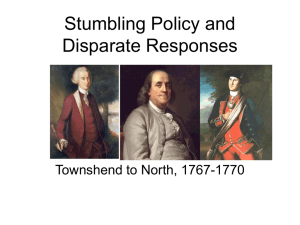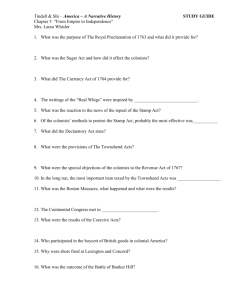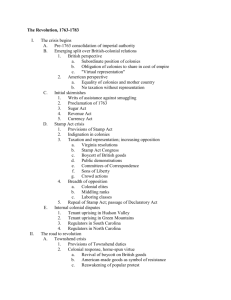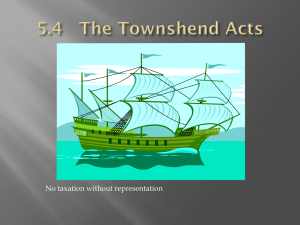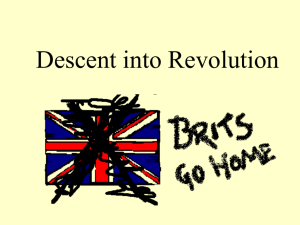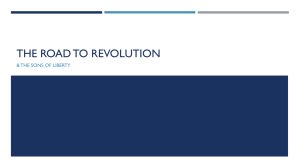File
advertisement
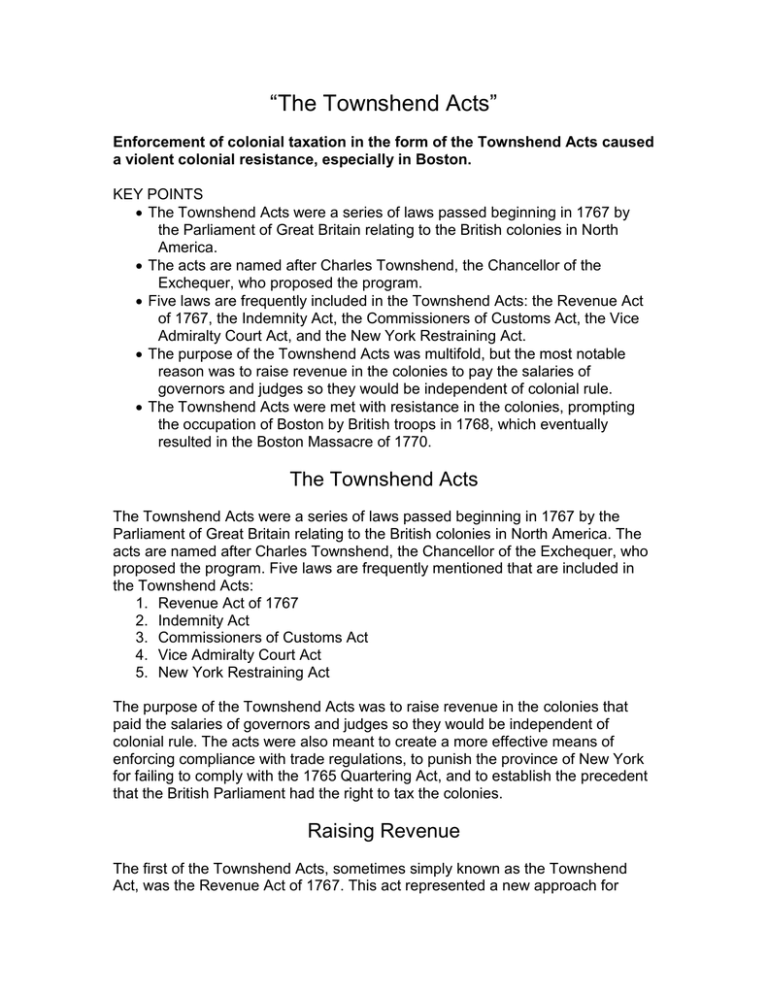
“The Townshend Acts” Enforcement of colonial taxation in the form of the Townshend Acts caused a violent colonial resistance, especially in Boston. KEY POINTS The Townshend Acts were a series of laws passed beginning in 1767 by the Parliament of Great Britain relating to the British colonies in North America. The acts are named after Charles Townshend, the Chancellor of the Exchequer, who proposed the program. Five laws are frequently included in the Townshend Acts: the Revenue Act of 1767, the Indemnity Act, the Commissioners of Customs Act, the Vice Admiralty Court Act, and the New York Restraining Act. The purpose of the Townshend Acts was multifold, but the most notable reason was to raise revenue in the colonies to pay the salaries of governors and judges so they would be independent of colonial rule. The Townshend Acts were met with resistance in the colonies, prompting the occupation of Boston by British troops in 1768, which eventually resulted in the Boston Massacre of 1770. The Townshend Acts The Townshend Acts were a series of laws passed beginning in 1767 by the Parliament of Great Britain relating to the British colonies in North America. The acts are named after Charles Townshend, the Chancellor of the Exchequer, who proposed the program. Five laws are frequently mentioned that are included in the Townshend Acts: 1. Revenue Act of 1767 2. Indemnity Act 3. Commissioners of Customs Act 4. Vice Admiralty Court Act 5. New York Restraining Act The purpose of the Townshend Acts was to raise revenue in the colonies that paid the salaries of governors and judges so they would be independent of colonial rule. The acts were also meant to create a more effective means of enforcing compliance with trade regulations, to punish the province of New York for failing to comply with the 1765 Quartering Act, and to establish the precedent that the British Parliament had the right to tax the colonies. Raising Revenue The first of the Townshend Acts, sometimes simply known as the Townshend Act, was the Revenue Act of 1767. This act represented a new approach for generating tax revenue in the American colonies after the repeal of the Stamp Act in 1766. The British government thought that because the colonists had objected to the Stamp Act on the grounds that it was a direct (or internal) tax, colonists would therefore accept indirect (or external) taxes, such as taxes on imports. With this in mind, Charles Townshend, the Chancellor of the Exchequer, devised a plan that placed new duties on paper, paint, lead, glass, and tea that were imported into the colonies. These were items that were not produced in North America that the colonists were only allowed to buy from Britain. The British government's belief that the colonists would accept external taxes resulted from a misunderstanding of the colonial objection to the Stamp Act. The colonial position was that any tax laid by Parliament for the purpose of raising revenue was unconstitutional. The original stated purpose of the Townshend duties was to raise revenue to pay the cost of maintaining an army in North America. Townshend changed the purpose of the tax plan, however, and instead decided to use the revenue to pay the salaries of some colonial governors and judges. Previously, the colonial assemblies had paid these salaries, but Parliament hoped to take the power of the purse away from the colonies. Reaction Merchants in the colonies, some of them smugglers, organized economic boycotts to pressure their British counterparts to work toward repealing the Townshend Acts. Boston merchants organized the first non-importation agreement, which called for merchants to suspend importation of certain British goods effective 1 January 1769. Merchants in other colonial ports eventually joined the boycott. However, the non-importation movement was not as effective as promoters had hoped. The boycott movement began to fail by 1770, and came to an end in 1771. Unrest in Boston The newly created American Customs Board was seated in Boston, so it was there that the Board concentrated on strictly enforcing the Townshend Acts. The acts were so unpopular in Boston that the Customs Board requested naval and military assistance. Commodore Samuel Hood complied by sending the fifty-gun warship HMS Romney in May 1768 (Figure 6.19). In June 1768, customs officials seized the Liberty, a sloop owned by leading Boston merchant John Hancock, on allegations that the ship had been involved in smuggling. Bostonians, already angry because the captain of the Romney had been impressing local sailors, began to riot. Given the unstable state of affairs in Massachusetts, Hillsborough instructed Governor Bernard to try to find evidence of treason in Boston. Parliament had determined that the Treason Act of 1543 was still in force, which would allow Bostonians to be transported to England to stand trial for treason. The possibility that American colonists might be arrested and sent to England for trial produced alarm and outrage in the colonies. People in Massachusetts learned in September 1768 that troops were on the way. Tensions rose after a customs employee killed Christopher Seider, a Boston teenager, in February 1770. Although British soldiers were not involved in that incident, resentment against the occupation escalated in the days that followed, resulting in the Boston Massacre on March 5, 1770. Partial Repeal On March 5, 1770— the same day as the Boston Massacre—Lord North, the new Prime Minister, presented a motion in the House of Commons that called for partial repeal of the Townshend Revenue Act. Although some in Parliament advocated a complete repeal of the act, North disagreed, arguing that the tea duty should be retained to assert the right of taxing the Americans. After debate, the Repeal Act received the Royal Assent on April 12, 1770.
